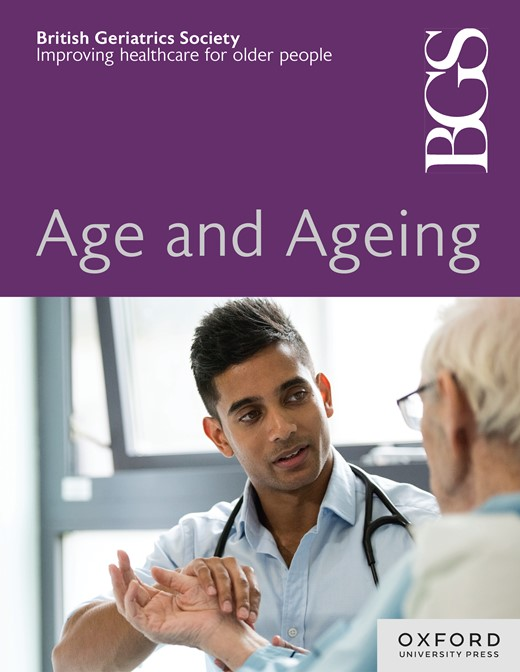老年人头晕与未来跌倒及跌倒相关伤害之间的关系:系统回顾与荟萃分析
IF 6
2区 医学
Q1 GERIATRICS & GERONTOLOGY
引用次数: 0
摘要
背景头晕在老年人中很常见,尤其是在接受跌倒服务的老年人中。然而,头晕与未来跌倒的关联程度尚未得到研究。本系统综述和荟萃分析评估了老年人头晕与未来跌倒及相关伤害之间的关系。方法 对 EMBASE、CINAHL Plus、SCOPUS 和 PsycINFO 数据库进行了检索,检索时间从开始到 2024 年 2 月 5 日。该综述已在 PROSPERO 上注册(注册编号:CRD42022371839)。针对头晕与未来跌倒(包括复发性和伤害性跌倒)的相关性进行了荟萃分析。针对不同结果进行了三项荟萃分析:任何类型跌倒(≥1次跌倒)、复发性跌倒(≥2次跌倒)和伤害性跌倒。结果 29 篇文章被纳入系统综述(N = 103 306 名参与者)。在对 14 篇文章(样本数 = 46 795 名参与者)进行的荟萃分析中,头晕与未来发生任何类型跌倒的几率明显较高(OR = 1.63,95% CI = 1.44-1.84)。在另一项涉及 7 篇文章(N = 5630 名参与者)的荟萃分析中,头晕患者未来再次跌倒的几率也明显更高(OR = 1.98,95% CI = 1.62-2.42)。在这两项荟萃分析中,即使对重要的混杂变量进行调整,也能观察到显著的整体关联性。相反,一项荟萃分析(三篇文章,N = 46 631 名参与者)显示,头晕与未来伤害性跌倒之间缺乏显著关联(OR = 1.12,95% CI = 0.87-1.45)。结论 头晕是老年人未来跌倒的独立预测因素。这些发现强调了认识到头晕是跌倒风险因素并采取适当干预措施的重要性。本文章由计算机程序翻译,如有差异,请以英文原文为准。
Association between dizziness and future falls and fall-related injuries in older adults: a systematic review and meta-analysis
Background Dizziness is common in older adults, especially in those attending falls services. Yet, the extent to which dizziness is associated with future falls has not been reviewed. This systematic review and meta-analysis assessed the association between dizziness and future falls and related injuries in older adults. Methods EMBASE, CINAHL Plus, SCOPUS and PsycINFO databases were searched from inception to 5 February 2024. The review was registered on PROSPERO (registration ID: CRD42022371839). Meta-analyses were conducted for the associations of dizziness with future falls (including recurrent and injurious falls). Three meta-analyses were performed on different outcomes: any-type falls (≥1 falls), recurrent falls (≥2 falls) and injurious falls. Results Twenty-nine articles were included in the systematic review (N = 103 306 participants). In a meta-analysis of 14 articles (N = 46 795 participants), dizziness was associated with significantly higher odds of any-type future falls (OR = 1.63, 95% CI = 1.44–1.84). In another meta-analysis involving seven articles (N = 5630 participants), individuals with dizziness also had significantly higher odds of future recurrent falls (OR = 1.98, 95% CI = 1.62–2.42). For both meta-analyses, significant overall associations were observed even when adjusted for important confounding variables. In contrast, a meta-analysis (three articles, N = 46 631 participants) revealed a lack of significant association between dizziness and future injurious falls (OR = 1.12, 95% CI = 0.87–1.45). Conclusions Dizziness is an independent predictor of future falls in older adults. These findings emphasise the importance of recognising dizziness as a risk factor for falls and implementing appropriate interventions.
求助全文
通过发布文献求助,成功后即可免费获取论文全文。
去求助
来源期刊

Age and ageing
医学-老年医学
CiteScore
9.20
自引率
6.00%
发文量
796
审稿时长
4-8 weeks
期刊介绍:
Age and Ageing is an international journal publishing refereed original articles and commissioned reviews on geriatric medicine and gerontology. Its range includes research on ageing and clinical, epidemiological, and psychological aspects of later life.
 求助内容:
求助内容: 应助结果提醒方式:
应助结果提醒方式:


